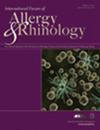Real-world predictors of dupilumab prescription in patients with chronic rhinosinusitis with nasal polyps
Abstract
Background
Despite increasing dupilumab use for chronic rhinosinusitis with nasal polyps (CRSwNP), little is known about the factors influencing its use in real-world practice. We aimed to identify factors that may predict dupilumab prescription in CRSwNP patients who have undergone endoscopic sinus surgery (ESS).
Methods
A single-institution, retrospective cohort study of patients who underwent ESS for CRSwNP between 2015 and 2023 was conducted. Demographics, comorbidities, 22-item sinonasal outcome test (SNOT-22) scores, and dupilumab prescription date were extracted from patient records. Intraoperative nasal mucus cytokine levels were measured using a multiplex bead assay. Univariate logistic regression analysis was performed to identify factors associated with dupilumab prescription, and multivariate logistic regression was used to adjust for surgery date.
Results
A total of 299 CRSwNP patients were included, including seventy (23.4%) who were prescribed dupilumab postoperatively. Patients were more likely to be prescribed dupilumab if they had asthma (odds ratio [OR] 2.304), aspirin-exacerbated respiratory disease (AERD, OR 3.375), elevated tissue eosinophils (OR 1.005), and higher 3-month postoperative SNOT-22 scores (OR 1.027). Patients prescribed dupilumab also had greater odds of having elevated mucus interleukin (IL)-5 (OR 1.128) and IL-13 (OR 1.213). When adjusting for surgery date, associated factors included: asthma (OR 2.444), AERD (OR 3.750), allergic rhinitis (OR 1.833), higher tissue eosinophils (OR 1.005), elevated 3-month SNOT-22 scores (OR 1.028), and higher IL-5 (OR 1.123) and IL-13 (OR 1.202) levels.
Conclusion
Asthma, AERD, allergic rhinitis, and elevated tissue eosinophil, IL-5, and IL-13 levels are predictive of dupilumab prescription in CRSwNP patients. These may serve as clinical and inflammatory biomarkers and can aid in counseling patients about expected disease trajectory.

 求助内容:
求助内容: 应助结果提醒方式:
应助结果提醒方式:


